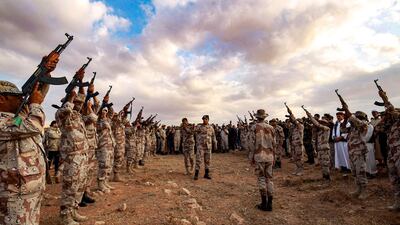The US House of Representatives advanced a bill today that could sanction many foreign actors involved in Libya’s civil war should the current ceasefire fall apart.
The House passed the bipartisan Libya Stabilization Act by voice vote today. The bill was introduced by Ted Deutch and Joe Wilson, the Democratic chairman and top Republican on the House’s Middle East panel.
“The most recent round of UN-led talks yielded an agreement to hold ‘free and fair, inclusive and credible presidential and parliamentary elections next year,” Mr Deutch said on the House floor before the vote. “However, hard work and difficult compromises lie ahead.”
“Progress on securing the withdrawal of weapons, foreign forces and mercenaries from Libya remain elusive. We should not forget that previous diplomatic efforts in Libya repeatedly failed.”
To that end, the new legislation would sanction any foreign actors backing either the Tripoli-based Government of National Accord or the Libyan National Army loyal to Field Marshall Khalifa Haftar. It would also place sanctions on anyone who illicitly exploits Libyan oil resources or financial institutions, as well as anyone complicit in human rights abuses. The bill allows the US president to defer the sanctions if a ceasefire is currently in effect.
Libya’s warring factions signed a ceasefire last month that called for the withdrawal of all foreign forces from the country for a minimum of three months as well as a prisoner exchange.
“These are important accomplishments and credit should be given to the Libyan representatives to the negotiations as well as to the UN, the US embassy in Libya and both the Tunisian and Egyptian governments for hosting the political and military discussions,” said Mr Deutch.
Mr Deutch’s bill would also require the State Department to submit a report to Congress on all foreign actors intervening in Libya.
While the bill implicates a myriad international actors in Libya, lawmakers reserved most of their public ire for Russia and Turkey, both of which have dispatched thousands of Syrian mercenaries on opposite sides of the conflict.
Sanctions aside, the bill also authorises $23 million in aid for next year to strengthen Libyan civil society, advance democracy, improve election infrastructure and fight corruption.
It also requires the State Department and the US Agency for International Development to submit a strategy on humanitarian aid for Libya and directs the US secretary of state to organise a high-level diplomatic summit to advance the Libyan peace process.
The Senate must also vote to pass the bill before the president has an opportunity to sign it into law.


